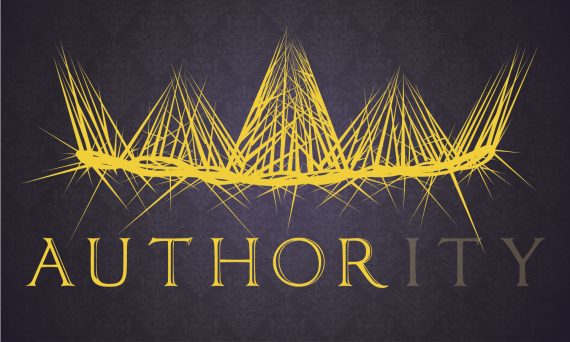It is popular in some Christian circles today to say that “Jesus is our authority; not the Bible.”
Others put it this way: “Jesus is the only Word of God; the Bible is not the Word of God.”
Some will even accuse you of “bibliolatry” (making the Bible an idol) if you believe that the Bible is the Word of God and is inspired, inerrant, and authoritative.
One author I recently read even accuses Christians of treason against Jesus Christ for thinking that the Bible is the Word of God.
I understand the concern, and I agree that bibliolatry is indeed a danger, but the question must nevertheless be asked, “If not for the Bible, how would we know about Jesus?”

Engage in a little thought experiment with me.
Let’s Assume Jesus is the ONLY Authority
Let us assume for a moment that Jesus is the only Word of God. That only Jesus is authoritative in revealing God to us, showing us how to live, and telling us what God wants, desires, and expects from us.
This is not hard to assume, because it is true.
But now, in your mind, get rid of everything you know about Jesus that comes from the Bible. If possible, try to wipe your mind of every detail, idea, fact, or thought about Jesus which has its origin in Scripture.
Now that you have done this, how much do you know about Jesus?
The answer is: nothing.
Sure, you might have some oral legends and myths that have been passed down through time for 2000 years, but how reliable and authoritative do you think these would be?
Without the Bible, we would have nothing authoritative to say about Jesus, and therefore, no firm foundation on which to base our Christian teachings and ideas.

We NEED an authoritative Bible so that we Can Follow our sole Authority, Jesus
For the Christian faith to be authoritative, we need eyewitness accounts of what Jesus said and how Jesus lived, and this is what we have in Scripture, primarily in the four Gospel accounts of Matthew, Mark, Luke, and John.
So is the Bible the Word of God? I would unequivocally say “Yes, it is.”
But since Jesus is my authority, I agree with Jesus that the Scriptures are authoritative only as long as they point us to Jesus. He said to the religious leaders of His day that they search the Scriptures daily because they think that in them they have life, but these Scriptures actually point to Jesus (John 5:39).
We cannot follow the authority of Jesus without the authority of Scripture, for Scripture teaches us and informs about Jesus.
So when it comes to the Christian authority, I have no qualms in saying that our authority is the Word of God. (Of course, it is important to also consider how the Bible is authoritative.) And by this, I mean that our authority is the written Word of God (the Bible) as it points us to the living Word of God, Jesus. We cannot have one without the other.

So BOTH Jesus and Scripture are Authoritative
We cannot have the authority of Jesus without the authority of Scripture.
In my forthcoming book, God’s Blueprints for Church Growth, I write this:
Chester McCalley, a pastor in Kansas City, Missouri was asked one Sunday by some visitors if they could see the church constitution. He noticed they were carrying their Bibles, so he told them, “You have it in your hands. Our church is governed by the Word of God.”
This pastor was correct, and yet a careful distinction must be made. While I have no issue with calling the Bible “the Word of God,” we must remember that the Bible is the Word of God only when we use it to teach others about the only true Word of God, Jesus Christ.
Jesus Christ is the Word, and the Bible can help us understand Jesus as the Word only so long as we remember that the Bible points to and teaches about Jesus. Jesus Himself chided the Bible experts of His day for diligently studying the Scriptures while not seeing that they pointed to Him (John 5:39).
If we learn, study, and teach Scripture just so we can learn more about Scripture, we have lost our way, and are not actually studying the Word of God. If you are studying the Bible and it is not pointing you to Jesus, then you are not truly studying the Word of God.
The Bible is only the Word of God when our study of it points us to Jesus, who is the Word of God.
And the great thing about both Jesus and Scripture being authoritative is that these two authorities do not contradict or disagree with each other (when both are properly understood).
So since I strive to be a faithful and committed follower of Jesus, I search the Scriptures daily, so that in them and through the authority of Scripture, I might be pointed to Jesus, my sole and ultimate authority.
If you want to see how I work some of this out, try one of books or start listening to my podcast.
This post is part of the June Synchroblog on the topic of authority. Here are the other contributors for this month:
- Authority for Believers – Soulcare Ministries
- Christian Authority – Done With Religion
- Who Gets To Say What Is Right Or Wrong? – What God May Really Be Like
- A Surprising Source of Spiritual Authority – Glenn Hager
- Surrendering Our Authority To Jesus – K. W. Lesley
- Under Who’s Authority – Layman Seeker
- Authority? – Metler
- The Age of the Spirit – Liz Dyer




Before the Bible was put into canon, who gave authority? Was it people? Just a random question.
Are you referring to the OT or NT? Either way, I guess the answer is somewhat the same. They had the prophets and apostles along with oral tradition.
Redeeming God with Jeremy Myers yeah. Certain denominations then use oral tradition to say they have authority
That’s true about the oral tradition and how it is used by some. Of course, we all have traditions that sway our understanding and application of Scripture …
Jesus gave authority to the Apostles (Mt 28:19), foremost of whom was Peter, the Rock upon whom Jesus built His Church. Peter, the first pope, is mentioned more in the NT than all the other apostles combined, and he is always, or almost always, named first. Also, when Peter and John ran to the empty tomb, with John, the beloved disciple who was probably closest to Jesus, arriving at the tomb first, why did he not enter but instead defer to Peter to enter first? (Jn 20: 1-8) The apostles then passed on their authority. (Acts 1:20-26, 14:23) It was these successors who eventually gave us the Bible as we know it, with a difference of 6 books between the Catholic and Protestant Bible. But don’t confuse the written Word as the only source of knowledge about Jesus, the early Church, and before this, the Patriarchs and Prophets, Israel, etc. That is what Paul means when he says to hold fast to the traditions that were taught, either by letter or word of mouth. (2 Thes 2:15)
I find this article interesting. I believe Jesus is our owe authority.I would like to study and learn more.
Jesus
so what’s an example of a verse that doesn’t support Jesus?
It seems to me what Jeremy is saying rings true. Jesus Christ described in scripture is our authority and Him and the word are both our authority. This works when we view scripture through the lens of Christ. Doesn’t scripture teach us Jesus is the Word of God.
“This works [Jesus and the Scriptures both being our authority] when we view scripture through the lens of Christ.” This statement makes no sense when you think about it. As Jeremy noted above, if we wipe away everything we know, or think we know, about Jesus from reading the scriptures, what knowledge of Him would we have? The answer is none. So how can we correctly view/understand/interpret scripture through the lens of Christ when it is the Bible that has shaped our view of Christ? Actually, that last statement doesn’t state the case accurately. It is not the Bible that shapes our view of Christ but the interpretation of the Bible held by the leaders of whichever church one chooses to belong. This ultimately boils down to the interpretation of particular individuals, because we can see in the history of Protestantism that, whenever a member/a few members disagreed with some teachings or practices of their church leaders at the time, they would just break off and start their own church. That is why today you have thousands upon thousands of Protestant denominations, which is why I would never be a Protestant. I mean, how would I know who has the fullness of the Truth? Is it the Lutherans, the Anglicans, the Presbyterians, Methodists, Baptists, etc., etc.? That is why this entire thread about who/what has authority, Jesus and/or the Bible, is off base. Of course Jesus is the ultimate authority, but this begs the question, who is this Jesus? Is it the Lutheran or Baptist or Methodist or any of the thousands of other Protestant denominations’ interpretation of Jesus that best reveals to us the true Jesus? It can’t be scripture then that is our sole authority by which we can best know Jesus, otherwise there wouldn’t BE so many denominations as they all use the same Bible. The authority a Christian should turn to to most clearly understand who Jesus is and what He taught is the Church He established, which today is known as the Roman Catholic Church.
Isn’t it amazing how the Bible is interpreted as the basis for dogmatic “Christian” beliefs, claiming to be “keeping our eyes upon Jesus” and yet be so divided?
Many use the following scripture to explain where they get their doctrines: “The person without the Spirit does not accept the things that come from the Spirit of God but considers them foolishness, and cannot understand them because they are discerned only through the Spirit” (1 Cor 2:14, NIV).
I wonder if they are confused/deceived by another Jesus and another gospel (2 Cor 11:4; Gal 1:6).
Exactly. I would love to have a Protestant explain to me, a Catholic, how Protestant Christians all claim to be led by the same Holy Spirit as they read the same Bible, yet there are what, 20,000 Protestant denominations. How does this fulfill Jesus’ desire that they all be one? (Jn 17:21) That is why we need the Church, which is THE pillar and foundation of the Truth. (1 Tim 3:15)
Yes, the “I just trust the Holy Spirit” argument doesn’t work very well, for the reasons you state.
Good article Jeremy
Jesus is the Logos, the Bible is rhema. These Greek words are both translated into English as Word.
Jeremy – You certainly made a good case, and I agree with your conclusion. However, (there is always a “however”) the Bible is so often understood in a manner that does not point to Jesus. People worship the Bible and have used it as justification for all manner of un-Jesus-like behavior. It was recently used to justify the administration’s policy of separating immigrant children from their parents. While I cannot deny what we know about Jesus comes from the Bible, it is still a difficult book to understand and reconcile, and is, therefore, frequently misused.
Hey, been super busy, so I just got around to reading your blog on authority. I am not sure if you care to here my 2 cents worth but here it goes. You say, “The Bible is only the Word of God when our study of it points us to Jesus, who is the Word of God.” The only problem with this sentence is that it is not actually a bible verse. I understand how you came up with the conclusion, but I think of so many other verses, one is Hebrews 4:12, “12 For the word of God is alive and active. Sharper than any double-edged sword, it penetrates even to dividing soul and spirit, joints and marrow; it judges the thoughts and attitudes of the heart.” this verse talks about soul and spirit and no mention of Jesus in particular, so is it trustworthy? YES! Also, the verse
Isaiah 55:11, “So will My word be which goes forth from My mouth;
It will not return to Me empty,
Without accomplishing what I desire,
And without succeeding in the matter for which I sent it.” NASB
Much of what the pharisees did was ADD to the word of God, a complete list of rules and regs, that were not from God. In conclusion, I agree we must take the Bible as authority and Jesus, but not ADD “as long as it points us to Jesus.” Incidentally, I think the entire Bible does point us to Jesus.